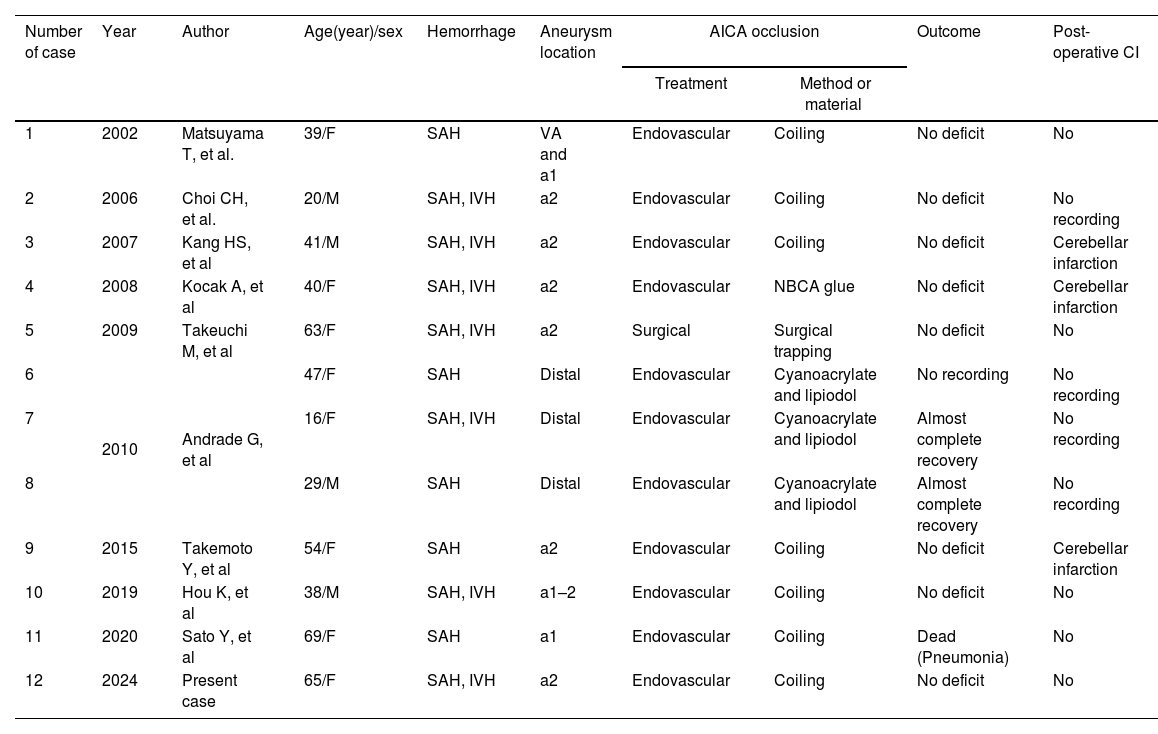Subarachnoid hemorrhage (SAH) caused by a dissecting aneurysm of the anterior inferior cerebellar artery (AICA) is rare. Partial coil embolization of the AICA may be an effective treatment. A 65-year-old woman presented at the emergency room with headache and vomiting for the past five days, after contracting coronavirus disease (COVID)-19. Computed tomography (CT) revealed SAH and intraventricular hemorrhage, and the patient was diagnosed with a dissecting aneurysm of the AICA. The patient underwent endovascular surgery, and the AICA was partially occluded using coiling, with no subsequent hearing disturbance, cranial nerve palsy, or infarction. Ventriculoperitoneal shunt surgery was performed for hydrocephalus at 7 weeks after SAH. The patient was discharged from hospital with no neurological deficit. We reported a rare case of ruptured AICA dissecting aneurysm, which was treated by partial coil embolization without neurological deficit or infarction.
La hemorragia subaracnoidea (HSA) causada por un aneurisma disecante de la arteria cerebelosa anteroinferior (AICA) es poco común. La embolización parcial con espirales (coils) de la AICA puede ser un tratamiento efectivo. Una mujer de 65 años se presentó en la sala de emergencias con cefalea y vómitos durante los últimos cinco días, después de haber contraído la enfermedad por coronavirus (COVID-19). La tomografía computarizada (TC) reveló HSA y hemorragia intraventricular, y se diagnosticó un aneurisma disecante de la AICA. La paciente fue sometida a cirugía endovascular, y la AICA fue parcialmente ocluida mediante espirales, sin que se observaran alteraciones auditivas, parálisis de nervios craneales ni infartos posteriores. A las 7 semanas después de la HSA se realizó una derivación ventriculoperitoneal para tratar la hidrocefalia. La paciente fue dada de alta del hospital sin déficit neurológico. Reportamos un caso raro de aneurisma disecante roto de la AICA tratado mediante embolización parcial con espirales, sin déficit neurológico ni infarto.
Article

If it is the first time you have accessed you can obtain your credentials by contacting Elsevier Spain in suscripciones@elsevier.com or by calling our Customer Service at902 88 87 40 if you are calling from Spain or at +34 932 418 800 (from 9 to 18h., GMT + 1) if you are calling outside of Spain.
If you already have your login data, please click here .
If you have forgotten your password you can you can recover it by clicking here and selecting the option ¿I have forgotten my password¿.










